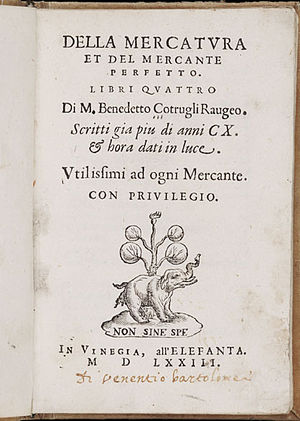- Della mercatura e del mercante perfetto
-
Della mercatura e del mercante perfetto written by Benedikt Kotruljević around 1400 was the first bookkeeping manuscript and trade manual.[1] It also goes by the names Of commerce and the perfect merchant,[1] On merchantry and the perfect merchant[2] and On trade and the perfect dealer.[3]
Contents
History
Several historians show the manuscript being written in 1458 and as the oldest known manuscript on the double-entry bookkeeping system, predating Luca Pacioli's claim by at least 36 years.[2][3][4][5][6] The reason Luca Pacioli (1445–1573) has received credit for the Birth of Accounting is because Kotruljević's work was not officially published until 1573.[7][8][9] An Italian version was published in Venice in 1573 by Franciscus Patricius.[2] A French translation of this manuscript was published in Lyon in 1613 under the title "Parfait négociant."[10]
An early copy of Della mercatura e del mercante perfetto from the end of the fifteenth century is at the National Library of Malta.[11][12] Another early copy is at Biblioteca Marciana in Venice.[4][13]
Manuscript content
The manuscript contains four books. The first is of the origin, form, and essence of being a merchant. The second talks of a merchant's religious commitment. The third is of moral virtues and policies. The fourth is administration of his home and family, and his economic matters.[6][14]
At the time of the manuscript merchandising was regarded as an art. The "Perfect Merchant" or "Perfect Dealer" was a man of culture motivated to good moral conduct and honest transactions to everyone he encountered. He had to be very sensitive to local interests in places where he conducted business. He had to know how to assess the political situation and the customary laws in order to successfully conduct his business. Kotruljević wrote in his bookkeeping and merchandising trade manual that not only must a merchant be a bookkeeper-accountant, but that he must also be a good writer, a rhetorician and a man of letters being diplomatic all the while.[15]
He contrasted the "Perfect Merchant" to sailors and soldiers by saying that they were many times naive of these points. He said they were of such dull mind that when they would drink in a tavern and buy bread at a market they often had delusions of grandeur and were not very diplomatic.[15]
References
- ^ a b Anzovin, p. 36, item 1441
- ^ a b c History of Croatian Science, 15th-19th centuries
- ^ a b Essay title - Financial Accounting And Accountants
- ^ a b Accounting History
- ^ SIESC 2007 in CROATIA
- ^ a b In Chapter XIII of the 1st book is called "order to keep " the records marketable '. There are only very vague rules, and the author observes: "..... narrating everything here wanting to '1 minute 'treatment would be too verbose et almost impossible to express it, "that without the living voice, writing can hardly be impa" rare. " However, one can easily argue that Benedict Cotrugli want to talk about the double entry. He says that the scriptures remind you credit, debt, cost of goods, profits and losses and any other cenda ago, adds that the merchant must hold the memorial, the newspaper, and the notebook with its own alphabet, which devesi entered in the log, what to do, the Whole capital and bring everything to your file. 'S work of the merchant Ragusin was not amended in the audience, Luca Pacioli is no longer the first exhibitor of record keeping. Alfieri, p. 117
- ^ Historical evolution of accounting
- ^ 3. Hypothesis of ‘the Pacioli Code’
- ^ Brief History of Accounting
- ^ Croatia - France, overview of historical and cultural relations - a sketch by Darko Zubrinic, 2006
- ^ A recent discovery of double-entry bookkeeping of 1475, p.123
- ^ LA RIEGOLA DE LIBRO Bookkeeping instructions from the mid-fifteenth century
- ^ Prospectus Title
- ^ Hangers, p. 99
- ^ a b Markets of the Mediterranean
Sources
- Alfieri, Vittorio (Prof.), La partita doppia applicata alle scritture delle antiche aziende mercantili veneziane, G.B. Paravia, 1891, Original from Columbia University
- Anzovin, Steven, Famous First Facts 2000, ISBN 0-8242-0958-3
- Hangers, Francis M., Historical-criticism on antichitla news, history and literature of 'Dubrovnik: divided into two volumes devoted Exalted and Senate of the Republic of Ragusa, Volume 2, Martecchini, 1803
Bibliography
- Cotrugli B., Della mercatura e del mercante perfetto: libri quattro, Liber, 1975
- Cotrugli B., The art of mercatura book, edited by U. Tucci, Arsenale, Venice 1990
- Gliubich S., Biographical dictionary of illustrious men of Dalmatia, reprint edition of the Vienna-Zara in 1856, Arnaldo Forni Editore, Bologna 1974
- Postma J.- AJ van der Helm, Paper for the 8th World Congress of Accounting Historians, Madrid, Spain, 19–21 July 2000
Categories:- 1458 establishments
- Accounting systems
- Republic of Ragusa
- Dubrovnik
- History of Croatia
- Accountancy
- Manuscripts
- Book terminology
Wikimedia Foundation. 2010.

